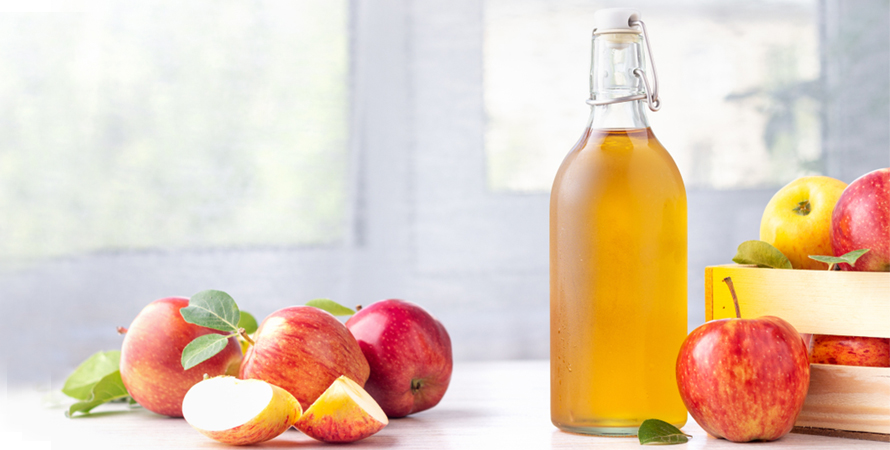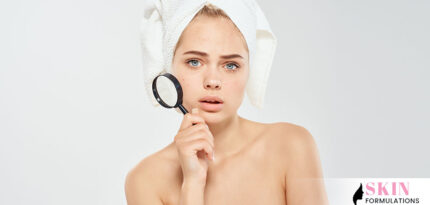How to Get Rid of Acne at Home: 5 Natural Ways

How to Treat Acne at Home?
Acne is an unpleasant skin condition that affects numerous people, sometimes into adulthood. This article will examine the causes behind its development, some useful home remedies for improving the skin, and methods on how to get rid of oily skin.
Overview
Acne is one of the most common skin conditions in existence, with an incidence of 9.38% worldwid. It most often occurs in teenagers, but many adults also suffer from this problem. It mostly develops on the face, back, neck, and shoulders.
According to Scientific Reports[1], it presents in different forms. Blackheads are clogged pores with the openings exposed to the air, and whiteheads are clogged follicles that do not have an opening. Whiteheads may lead to pimples in different degrees of severity.
Acne can be hard to get rid of, and in some cases, it can leave scars. That’s why it’s important to treat it and to follow a good skincare routine. There are some treatments available.
For a very serious condition, doctors sometimes prescribe oral antibiotics. There are also several topical creams available, some of which use organic ingredients.
In addition, there are very helpful home remedies for acne care that you can try which provide a good chance of diminishing your symptoms.
Why do we get acne?
Much of the time, acne is caused by hereditary factors. A twin study published in the Journal of Investigative Dermatology[2] found a high genetic incidence in the development of this condition. If other family members have suffered from acne, there’s a good chance that you will too.
Hormones also play a key role. Acne can be caused by overactivity of androgens, which leads the sebaceous glands to get bigger. They then produce extra sebum, which is an oily material that is good for the skin but can also lead to blackheads, whiteheads, or pimples in excess amounts.
Acne is also caused by hair follicles becoming clogged with bacteria, dead skin cells, or oil. It is imperative to have a regular skincare routine to make sure you keep your pores clean. You may also want to try some helpful home remedies.
Acne Home Treatments
There are natural ways for acne care that you can carry out in the comfort of your own home. Some of these remedies are backed by scientific research that shows their efficacy. They aren’t expensive and are certainly worth a shot.
1] Apple Cider Vinegar

Although there’s no scientific research yet to support the claim, many people think that apple cider vinegar is an effective acne treatment. It contains antimicrobial properties that can kill bacteria[3]. This is due to the presence of acetic acid, which helps inhibit the growth of these microbes. It may be a useful substance to add to your skincare routine, but in mind that this is an acid, so it could lead to skin irritation.
2] Tea Tree Oil
This substance is rich in both anti-inflammatory and anti-microbial properties, making it a very useful acne treatment. It can both kill bacteria on the skin and reduce the swelling caused by the condition.
Tea tree oil could be helpful for acne care. A review published in the International Journal of Microbial Agents[4] found that tea tree oil lessens the number of lesions on people with mild to moderate acne. For more severe conditions, it will not help. Note that this substance causes skin irritation in some people, so stop using it if this occurs.
3] Witch Hazel
This remedy comes from the bark of the Hamamelis Virginiana plant. According to the Journal of Clinical and Aesthetic Dermatology[5], it contains a high amount of a natural compound called tannin that acts as an astringent and can get rid of oily skin.
Witch Hazel also contains both anti-inflammatory and anti-viral properties, so it could be a helpful treatment. In some cases, it can irritate the skin if you have sensitive skin or an allergy.
4] Aloe Vera

This is a flowering plant which has a medicinal oil in its leaves. This substance is a potent source of anti-inflammatory agents, suggesting that it could be helpful in the treatment of acne. It’s also known as an effective wound-healing remedy, and has antiseptic, anti-bacterial, and anti-viral properties.
The benefits of aloe vera in treating acne are supported by research. It contains properties that are useful for acne care. A study published in the Journal of Dermatological Treatment[6] found aloe vera to be a very good treatment for mild to moderate acne.
5] Zinc Supplements
This is a mineral which we usually derive from food. It’s essential for our bodies because it plays an important role in metabolism, DNS synthesis, and cell division. There’s some research to suggest that low levels of zinc are linked to the severity of acne.
There’s a significant amount of scientific support for the idea that taking zinc can diminish the symptoms of acne. Zinc could be an essential component of acne care. A study published in Dermatologic Therapy gave acne patients zinc 3 times a day for 8 weeks. The vast majority of the participants had an 80-100% reduction in symptoms.
Thwarting Breakouts

If you’re prone to acne breakouts, there are a few things you can do to lessen the likelihood that they will happen. When you purchase skin care products, make sure they do not clog the pores, and they should contain compounds that can get rid of oily skin.
According to Harvard Health Publishing[7], they may say something like ‘non-comedogenic’ or ‘free of oil’ to indicate this. Avoid hair products that contain oil.
If you wear makeup, make sure you wash it off carefully before going to bed. Also, stay out of the sun or wear a good sun-block when you’re outside. This could darken the spots and make them look worse.
Lifestyle Changes
One of the best things you can do for your skin is to lead a healthy lifestyle. Although the sweat caused by exercise can exacerbate acne in some cases, exercising in general improves your circulation and enhances the complexion. It helps to lessen the chance of breakouts caused by hormonal fluctuations.
Following a healthy diet can have a significantly positive impact on your skin. There’s evidence that shows diets high in sugar can worsen acne. Dairy is another substance which has a mild association. Dermatoendocrinology suggests a diet high in fruits, vegetables, and proteins to combat acne.
Take Care of Your Skin

If you want to lessen the chance of breakouts, it’s important to follow a skincare routine every day to make sure your pores don’t get clogged. Clean twice a day with a good-quality cleanser, and exfoliate to clear out your pores. Use a moisturizer that contains sun block, so it won’t exacerbate your condition.
Frequently Asked Questions:
1] Can I use makeup if I have acne?
Most makeup won’t cause acne, but some products will clog the pores and worsen your condition. In some cases, they can also make the acne look worse by darkening the spots, although if you are skilled you can use it to help cover the condition as well.
2] Why do teenagers get a lot of acne?
During the teenage years, the body begins to produce more of a hormone called androgen. This leads to the release of sebum, which is an oily substance that protects and hydrates the skin. The combination of oil and dead skin cells in the hair follicle can lead to skin to become inflamed.
3] Would a dermatologist help with my acne?
Yes, a dermatologist can certainly help treat your acne and get rid of oily skin. If you have severe acne, you should make an appointment. Most likely, they will give you antibiotics plus a cream to rub on the infected areas. They may prescribe a potent medication called Isotretinoin.
The Final Word
Taking good care of your skin is essential to keeping your pores clean, getting rid of oily skin, and diminishing acne. If you have mild to moderate acne, there are some natural remedies you can try such as apple cider vinegar, aloe, zinc supplements, witch hazel, and tea tree oil. Some of these treatments may be very effective.
If your condition is more severe, it’s a good idea to also go to a dermatologist and get stronger medication to help clear up the condition. You’ll feel better about the way you look, and your skin will be healthier.
References
1] https://www.nature.com/articles/s41598-020-62715-3#:~:text=Acne%20Epidemiology,ages)%20of%209.38%251.2] https://pubmed.ncbi.nlm.nih.gov/12485434/
3] https://www.ncbi.nlm.nih.gov/pmc/articles/PMC5788933/
4] https://www.sciencedirect.com/science/article/abs/pii/S0924857914003458
5] https://www.sciencedirect.com/science/article/abs/pii/S0924857914003458
6] https://www.tandfonline.com/doi/abs/10.3109/09546634.2013.768328
7] https://www.health.harvard.edu/blog/adult-acne-understanding-underlying-causes-and-banishing-breakouts-2019092117816







